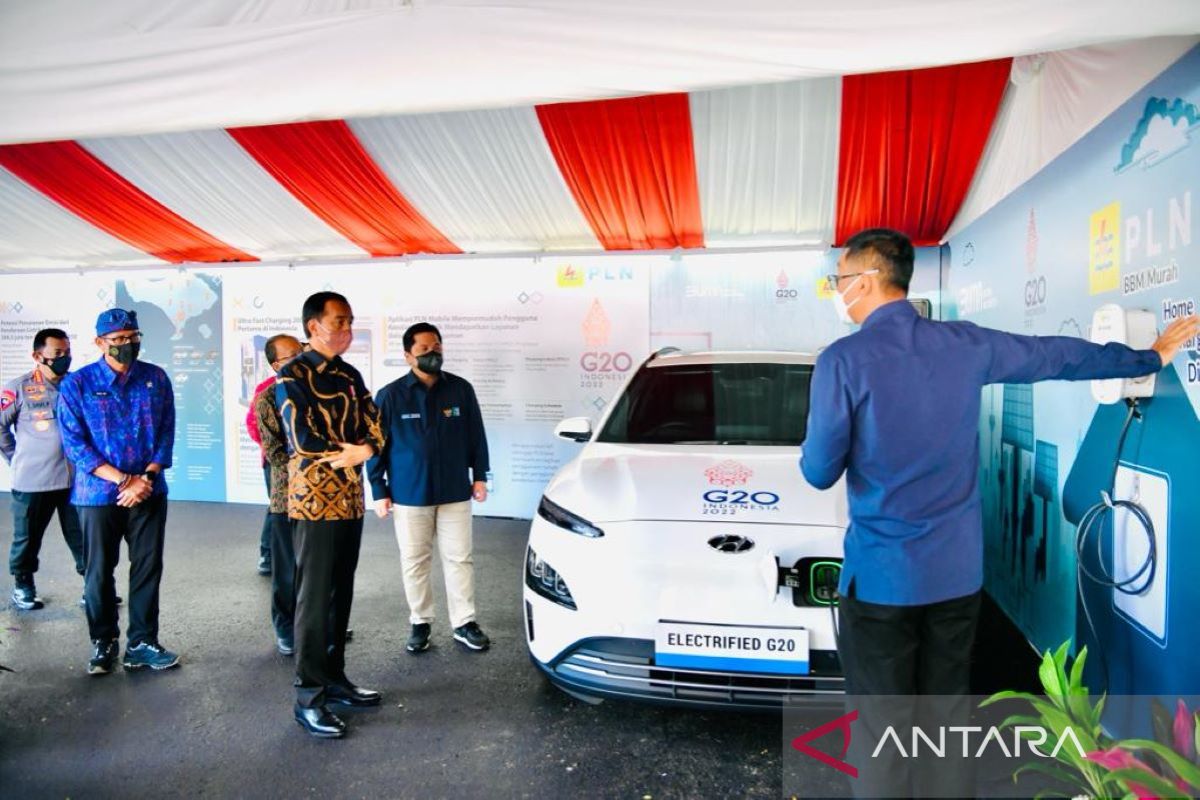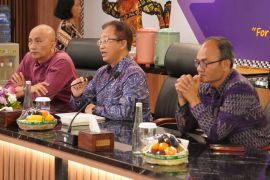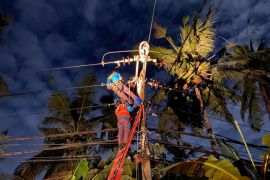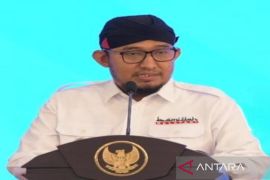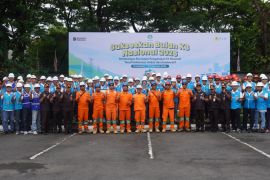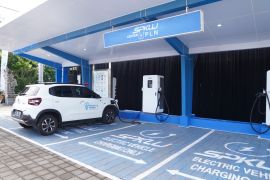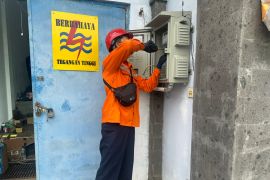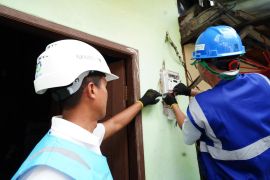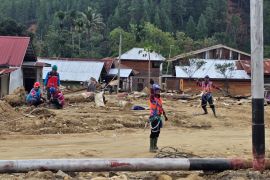Badung, Bali (ANTARA) - State-run electricity provider PT PLN (Persero) has optimized the momentum of Indonesia’s 2022 G20 Presidency by getting involved in promoting and developing green energy transformation that becomes one of the main agendas of the forum.
Hence, in order to ensure the success of the G20 Summit, which will be held in Bali Province on November 15-16, 2022, the company is constructing 60 Ultra-Fast Electric Vehicle Charging Stations (SPKLUs) to support the operations of around 656 electric vehicles that will be used by the G20 Summit delegates.
PT PLN’s Regional Director of Java, Madura, and Bali Regions Haryanto W. S. stated that the progress in the establishment of SPKLUs has reached 31.67 percent and is targeted to be completed in August 2022.
He conveyed the information while receiving a visit from Secretary of State Secretariat Ministry Setya Utama at one of the Fast SPKLUs construction sites at Badung District, Bali Province, on March 10, 2022.
However, to anticipate the demand of the vehicle recharging service and to avoid long queues at charging stations, PT PLN has planned to increase the number of SPKLUs as well as home-charging units, he remarked.
Haryanto noted that the 60 Ultra-Fast SPKLUs will be provided at several locations throughout Bali Province.
Some 28 SPKLUs will be provided at the parking area of the Apurva Kempinski Hotel; 18 SPKLUs will be built at the state-run Indonesia Tourism Development Corporation's (ITDC’s) the central parking area; while 14 SPKLUs will be established in the parking area of the Ngurah Rai Mangrove Forest Park, he stated.
Meanwhile, several completed SPKLUs were inaugurated by President Joko Widodo (Jokowi) in Nusa Dua, Badung District, Bali Province, on March 25, 2022.
"The implementation of the G20 Presidency is a great opportunity to showcase our commitment to reducing carbon emissions through the utilization of electric cars amid the G20 Summit," he remarked.
Haryanto believes that the G20 Summit could also be an opportunity for Indonesia to present itself as one of the leading countries in the development of electric vehicles, which is apparent from the establishment of the vehicle battery and component industry as well as the construction of SPKLUs and home charging facilities.
"I am delighted that PLN is preparing 60 units of 200 kilowatts (kW) Ultra-Fast SPKLUs, which are the first Ultra-Fast SPKLUs in Indonesia, as well as 150 home-charging facilities, which will be used by G20 delegates later," he stated.
The development of electric vehicles is one of the attempts to implement energy transition from fossil energy to new and renewable energy.
It can be a solution for Indonesia to reduce the number of fuel imports and preserve the state budget since currently, people have become increasingly dependent on fossil fuel and energy.
President Director of PT PLN Darmawan Prasodjo stated that Ultra-Fast SPKLUs only take less than 30 minutes to charge one vehicle.
In addition, the facility applies a dynamic load distribution system, which can speed up the charging process while charging two electric cars concurrently.
Baca juga: PLN dan energi hijau untuk G20
Strategic value
Jokowi noted that people’s dependence on fossil fuels had burdened the state budget as well as made Indonesia’s current account and trade balance to swing to a deficit.
Thus, such a condition cannot be allowed. Hence, Indonesia must find a solution to realize energy independence, such as by using electric cars during the implementation of the G20 Summit.
"We can show the world that the electric vehicle ecosystem in Indonesia is growing and developing fast, starting from the upstream sector of the vehicle battery and component manufacturing to the downstream sector of the SPKLUs and home-charging establishment," the Indonesian president added.
PT PLN has expressed its readiness to support the conversion of conventional transport to electric vehicles.
This implementation holds strategic value to reduce fuel subsidies in the state budget, save Indonesia’s foreign exchange, as well as realize national energy independence.
"The use of fossil fuel-based vehicles is expensive. Hence, currently, they are replaced by electric vehicles whose operational cost is cheaper," Prasodjo noted.
Earlier, Energy and Mineral Resources (ESDM) Minister Arifin Tasrif had noted that the utilization of electric vehicles will also help vehicle owners save on spending since electric energy is cheaper than fuel.
"We assume that using two liters of fuel will cost about Rp24 thousand. However, people will only spend a quarter of the amount if they use electrical energy, which is about Rp6 thousand,” he stated.
Thus, the ESDM Ministry is aiming to convert 120 million conventional vehicles into electric ones throughout Indonesia in the next 10 years.
In addition, the conversion is part of the clean energy transition attempts to achieve the net zero emission target by 2060 according to Indonesia’s Nationally Determined Contribution target.
Hence, apart from the development of electric vehicles and SPKLUs, PT PLN has also encouraged the application of induction stoves, implemented digital-based electricity services through the PLN Mobile app, as well as pushed the use of rooftop solar power plant (PLTS).
The state-owned corporation has estimated that the clean energy transition attempts will potentially save Rp2,044 trillion of the country's foreign exchange by 2060.
Thus, to realize the target and support the development of the electric vehicle ecosystem in Indonesia, PT PLN is working on increasing the number of SPKLUs.
As of February 2022, a total of 267 SPKLUs have been operated in 195 locations throughout the country.
Out of the figure, PT PLN owns 120 units that are built at 92 locations. By the end of 2022, the enterprise is targeting to have established 580 SPKLUs and 4,900 Electric Vehicle Battery Exchange Stations (SPBKLU).
Thus, in addition to doing business and saving the state budget, the electric vehicle ecosystem has an important strategic value to reduce carbon emissions that provides hope for a cleaner Earth for our future generations.


